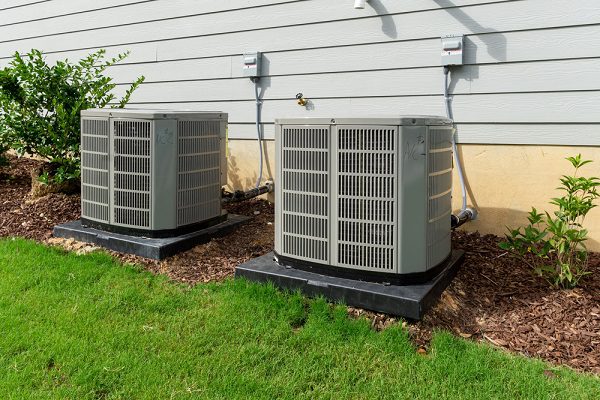Throughout the summer, your HVAC system works tirelessly to keep you cool and comfortable despite the climbing temperatures. During times of heavy operation, you may notice water droplets on your AC unit or lining your vents. But what does it mean?
Your instincts might scream that any condensation on your AC unit is dangerous or a harbinger of doom, but this isn’t necessarily true. Keep reading to learn what causes condensation to build up on your AC unit and when to worry about it.
How Much Condensation from AC Is Normal?
A little bit of condensation on your AC unit or on your vents is totally normal and is to be expected during the summer, especially in humid environments. It occurs when warm, moist air meets a cool surface, like when your drinking cup sweats. Your HVAC system is well-equipped to deal with a normal amount of condensation forming.
Condensation that forms in your HVAC system drips down into the drainage pan and is then carried out of your house through the condensate drain line. At the peak of summer, your condensate drain line could remove several gallons of condensation from your system every day.
As long as there’s no excess moisture building up, there’s no need to worry. However, if you start noticing condensation dripping or blowing from your vents or building up around your unit itself, it’s time to investigate the problem.
Why Is There So Much Condensation on My AC Unit?
When you notice condensation dripping from the side of your AC unit, or water blowing from your vents, there are a few usual suspects that are typically responsible. Below are some common problems that could lead to a buildup of condensation in or around your HVAC system:
Clogged Drain Line
Most problems with excess condensation are caused by improper drainage in your HVAC system. If you don’t keep up with regular cleaning and maintenance, all kinds of stuff can find its way into your drain line.
Dirt, mold, bacteria, and debris can all accumulate and block the flow of water through the drain line. This blocking causes water to back up and build up elsewhere in your system.
Dirty Air Filter
Most homeowners know to change their air filter regularly but don’t really know why. A dirty air filter can restrict airflow and prevent the evaporator coil from getting the proper amount of air. When this happens, the evaporator coils may get too cold and freeze over. As they melt, the ice turns into water and gets pushed through your HVAC system.
You should visually inspect your AC unit’s air filter at least once a month between AC tune-ups and clean it or change it whenever it gets full.
Low Refrigerant Levels
If your AC unit is hiding a refrigerant leak, or it hasn’t been topped off in years, low refrigerant levels can cause problems with your AC system. In addition to not cooling as efficiently, low refrigerant levels can cause your evaporator coils to freeze over.
When the coils thaw, the condensation can overwhelm your drainage system and find itself in places where it shouldn’t be.
Drainage Pan Problems
The drainage pan in your air conditioner is what catches any condensation that forms in your unit. If there are problems with the pan, like cracking, warping, or corrosion, it can cause water to leak. Luckily, this is a simple AC repair that your local cooling services expert can take care of for you.
Why Is My Air Conditioner Blowing Out Condensation?
Discovering your air conditioner is blowing more than cool air can be a jarring experience. If your air conditioner is blowing out condensation, it could be because of any of the above problems. When problems aren’t caught early and fixed, it can cause condensation to spread through your ducts and come out of your vents.
What Problems Can Excess Condensation Cause?
It might be easy to wipe away the water from your vents and ignore the issue, but if you let excess condensation continue, it can have a huge impact on your home. Below are some common issues that excess condensation can lead to when left unchecked:
Increased AC Repairs
Water in your AC unit where it shouldn’t be is never good. Excess moisture can cause components to corrode and degrade faster. Additionally, all of the water can overwhelm your drainage system and cause your entire system to shut down. That’s why it’s important to call your local HVAC contractor at the first sign of trouble.
For example, evaporator coils that are frozen over can be thawed out and fixed when this condition is caught early, but if you let the problem persist, your system will require more expensive repairs.
Increased Humidity
It makes sense that an increase in condensation would lead to an increase in moisture levels in the air. The problem is that increased humidity levels can create the perfect warm and moist environment that mold and mildew love. That means excess condensation can actually have a negative impact on your family’s health.
If you start to notice black or brown spots on or around your vents, it’s time to call in the pros. These spots are a surefire sign you have mold, and you don’t want to take the risk of spreading it anywhere else. With it being located around your vents, where the air is constantly entering, you’ll want to take care of it as soon as possible.
Water Damage
When your AC system is working properly, all of the condensation drains to the outside of your house. But when condensation starts draining into your house, it can cause water damage to your property.
If there’s a dripping vent in a room you don’t use much, the water can accumulate and cause serious damage to your flooring, nearby furniture, appliances, or even your walls.
How Do I Stop Condensation in My Air Conditioner?
When you notice condensation starting to build up on your AC unit, inspect your unit to see if you can pinpoint the problem. Something simple like an overfilled air filter is pretty easy to spot and fix on the spot. However, since your eyes are untrained, anything more complicated than a clogged air filter may be difficult to diagnose by yourself.
That’s why it’s a good idea to enlist the help of a local HVAC expert when you start to notice condensation building up. With their help, it’s easier to get to the root of the problem and fix it before it forces you to get AC repairs.
How Annual AC Tune-Ups Can Help Condensation Problems
Annual tune-ups are important for all Champaign, IL, homeowners. When carried out by a professional, they can help extend the life of your HVAC system and catch any hidden issues before they manifest into any major problems.
When you keep up with annual maintenance and AC tune-ups, you can expect:
- Improved performance
- Fewer AC repairs
- Improved air quality
- Lowered energy bills
- Increased comfort
Many homeowners neglect annual tune-ups because they don’t want to spend money when their AC isn’t actively broken down, but one of the major benefits of tune-ups is they can help prevent those major breakdowns from occurring.
If your system is overdue for a tune-up, it’s never a bad time to call and schedule a visit with your local HVAC expert.
Whether condensation is building around up your vents or your system could just use an expert touch, give the pros at Castle Home Comfort Heating & Cooling a call today. From AC repairs and installation to timely maintenance, our team provides excellent all-around care.

